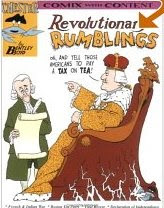Hancock calls for debate on the resolution, and Dickinson, for the 24th time, moves to indefinitely postpone the question of independence. Read seconds the motion and the Congress votes on Dickinson's motion. The vote goes down the line: Bartlett, Adams and Lee immediately cast their votes for debating the issue of independence, soon joined by Roger Sherman of Connecticut and two-thirds of the Delaware delegation. Lewis Morris of New York abstains "courteously". Dickinson unequivocally votes against debate. Samuel Chase of Maryland states that he would welcome independence if it were given, but does not believe the war can be won, and thus votes nay. Rutledge explains that he feels no need for immediate action, and casts his vote for nay as well, immediately parroted (as usual) by Joseph Hewes of North Carolina. When Thomson calls for Dr. Hall's vote, Hall explains that though he is personally for independence, his legislature is against it, and thus is unsure how to vote. But he prefers to err on the side of his constituency and votes nay, leaving the deciding vote to Stephen Hopkins who is "visiting the necessary". He returns in time to vote in favor of debate, stating that he'd "never seen, heard, nor smelled an issue that was so dangerous it couldn't be talked about." For his trouble, he gets his rum privileges back.
The most vocal of the delegates state their positions: Dickinson is against revolt and rebellion, but in favor of petitioning King George on their grievances. Adams and Franklin argue that the colonists have not been granted the full rights of Englishmen and that it is too late for reconciliation — a year has passed since the Battles of Lexington and Concord. Rutledge, meanwhile, is worried that the rights of the individual states would be subsumed by a strong federation and Chase questions the likelihood of an American victory over the awesome might of England.
As the argument between the delegates grows more heated, Dickinson launches into a long tirade against Adams and his supporters, calling him an agitator and a madman. Adams lashes back by accusing Dickinson and his fellow conservative "cool, considerate men" of hanging to the rear of every issue to see who will triumph; this results in a physical fight breaking out. Caesar Rodney of Delaware separates the two and berates them for not focusing on the real enemy: England. He collapses from the overexertion; he has cancer. Colonel McKean offers to take him back home. This leaves the Delaware delegation with only one man present, George Read, and he is not in favor of independence. Rutledge, seeing the majority swinging in his favor, moves for a vote on the question of independence. Franklin seeks to stall the motion, and asks that the resolution be read aloud again. As Thomson is reading it, the new New Jersey delegation arrives, led by Rev. John Witherspoon. He informs the Congress that they have been instructed to vote in favor of independence. The vote is now six for independence and six against (with New York's usual "courteous" abstention), and Adams reminds Hancock of his duty as President to break all ties. Seeing that the resolution might pass, Dickinson moves that any vote for independence must pass unanimously on the grounds that "no colony [may] be torn from its mother country without its own consent." His motion is seconded by Read, and the vote produces the same tie, which Hancock breaks by voting for unanimity. His reasoning is that without consent of all the colonies, any of them voting against independence would likely be forced to fight on England's side, and that the new nation would "carry as its emblem the mark of Cain."
Saturday, March 8, 2008
1776: The Great Debate
Subscribe to:
Post Comments (Atom)








0 Comments:
Post a Comment